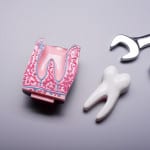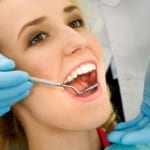 You’d be amazed at how strong the teeth are, but they’re not immune to damage. If you’ve got a broken tooth, there are various treatments and restorative techniques we can use to repair your damaged tooth and restore your smile to its former glory. These include:
You’d be amazed at how strong the teeth are, but they’re not immune to damage. If you’ve got a broken tooth, there are various treatments and restorative techniques we can use to repair your damaged tooth and restore your smile to its former glory. These include:
- Dental bonding: in cases where the tooth is chipped, rather than broken, we can use a technique known as dental bonding. Bonding involves using a tooth-coloured resin material called composite to fill in the broken part of the tooth and reshape the tooth. This treatment offers both restorative and cosmetic benefits, and it only takes around one hour. There’s no pain involved, and you’ll notice the difference immediately.
- Crowns: dental crowns are types of restoration that are used to repair broken and decayed teeth. Crowns are sometimes called caps because they are placed over the top of the remaining tooth structure. Before a crown is fitted, the tooth will be shaped and cleaned and any damaged tissue will be removed. Every crown is custom-made to ensure a perfect fit and we can use ceramics to produce very natural aesthetics.
- Filling: if the tooth has a very minor fracture, it may be possible to restore it using a white filling. These fillings are made from a mixture of dental composite and resins. Your dentist will match the shade of the composite to your tooth colour so that you won’t be able to tell the difference between the composite and the natural tooth tissue.
If you have a broken or chipped tooth, we recommend getting in touch as soon as possible.











 Dental veneers are artificial tooth crowns that fit over existing teeeth to improve their cosmetic appearance. When used correctly, they can restore the appearance of a healthy smile and be invaluable in helping patients regain their self-confidence.
Dental veneers are artificial tooth crowns that fit over existing teeeth to improve their cosmetic appearance. When used correctly, they can restore the appearance of a healthy smile and be invaluable in helping patients regain their self-confidence.

